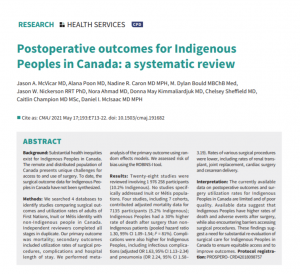Dr. Nadine Caron, co-instructor of SURG 518, recently published a systematic review of studies estimating the association between Indigenous identity and surgical rates or outcomes in Canada.
To read the full text, please visit here.
Abstract
Background: Substantial health inequities exist for Indigenous Peoples in Canada. The remote and distributed population of Canada presents unique challenges for access to and use of surgery. To date, the surgical outcome data for Indigenous Peoples in Canada have not been synthesized.
Methods: We searched 4 databases to identify studies comparing surgical outcomes and utilization rates of adults of First Nations, Inuit or Métis identity with non-Indigenous people in Canada. Independent reviewers completed all stages in duplicate. Our primary outcome was mortality; secondary outcomes included utilization rates of surgical procedures, complications and hospital length of stay. We performed meta-analysis of the primary outcome using random effects models. We assessed risk of bias using the ROBINS-I tool.
Results: Twenty-eight studies were reviewed involving 1 976 258 participants (10.2% Indigenous). No studies specifically addressed Inuit or Métis populations. Four studies, including 7 cohorts, contributed adjusted mortality data for 7135 participants (5.2% Indigenous); Indigenous Peoples had a 30% higher rate of death after surgery than non-Indigenous patients (pooled hazard ratio 1.30, 95% CI 1.09–1.54; I2 = 81%). Complications were also higher for Indigenous Peoples, including infectious complications (adjusted OR 1.63, 95% CI 1.13–2.34) and pneumonia (OR 2.24, 95% CI 1.58–3.19). Rates of various surgical procedures were lower, including rates of renal transplant, joint replacement, cardiac surgery and cesarean delivery.
Conclusion: In a systematic review of surgical care utilization and outcomes, we found that Canadian Indigenous Peoples had higher rates of mortality and adverse events, with lower rates of surgical utilization. First Nations, Inuit and Métis communities are increasingly prepared to direct Indigenous population health research and policy. The rights and benefits of research to Indigenous communities, colonial policies and anti-Indigenous racism should be considered in any analysis of health policy and outcomes research.
Reference: Jason A. McVicar, Alana Poon, Nadine R. Caron, M. Dylan Bould, Jason W. Nickerson, Nora Ahmad, Donna May Kimmaliardjuk, Chelsey Sheffield, Caitlin Champion, Daniel I. McIsaac. Postoperative outcomes for Indigenous Peoples in Canada: a systematic review.

